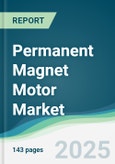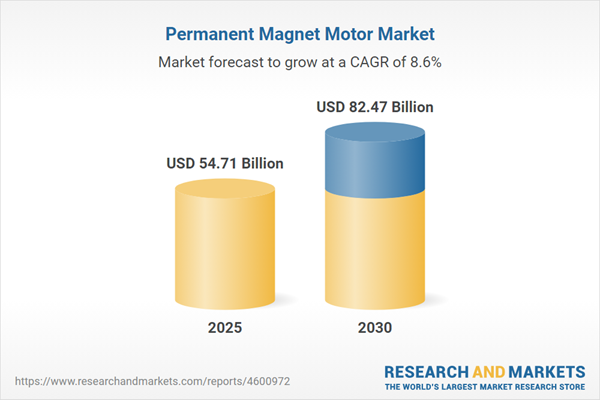The Permanent Magnet Motor Market Study provides a comprehensive analysis of the global permanent magnet motor market, delivering actionable insights for industry experts navigating this rapidly evolving sector. This study examines market trends, technological advancements, and competitive strategies, with detailed segmentation by motor type, magnet type, industry vertical, and geography. Designed to support strategic decision-making, the Permanent Magnet Motor Market Study equips stakeholders with data-driven forecasts, regulatory insights, and competitive intelligence to capitalize on opportunities in this dynamic market.
Study Overview
The Permanent Magnet Motor Market Study explores the global permanent magnet motor market, segmented by motor type (Direct Current Motor, Alternating Current Motor, Others), magnet type (Ferrite, Neodymium, Samarium Cobalt), industry vertical (Consumer Electronics, Manufacturing, Energy, Automotive, Others), and geography (North America, South America, Europe, Middle East and Africa, Asia Pacific). It includes in-depth analyses such as Porter’s Five Forces Analysis, Industry Value Chain Analysis, and market share evaluations, alongside strategic recommendations and regulatory insights to help stakeholders leverage growth opportunities.Competitive Environment and Analysis
In the competitive intelligence section of the Permanent Magnet Motor Market Study, key players are highlighted for their strategic initiatives to strengthen market presence. For instance,Siemens AG
has recently introduced a new line of high-efficiency neodymium-based permanent magnet motors optimized for electric vehicle applications, enhancing performance and energy savings in the automotive sector. This development reinforces Siemens’ leadership in sustainable motor solutions. Similarly,Nidec Corporation
has expanded its portfolio through a strategic acquisition of a specialized motor technology firm, enhancing its offerings of samarium cobalt-based motors for energy and manufacturing applications. The study also covers market share analysis, mergers, acquisitions, and a competitive dashboard to provide a holistic view of the competitive landscape.Conclusion
The Permanent Magnet Motor Market Study is an essential resource for industry experts seeking to understand the complexities of the permanent magnet motor market. By offering detailed segmentation, technological outlooks, and competitive intelligence, this study provides a robust framework for identifying opportunities and formulating effective strategies. With leading players like Siemens AG and Nidec Corporation driving innovation in high-efficiency and specialized motor solutions, the Permanent Magnet Motor Market Study empowers stakeholders to stay competitive in this dynamic and rapidly growing industry.Key Benefits of this Report:
- Insightful Analysis: Gain detailed market insights covering major as well as emerging geographical regions, focusing on customer segments, government policies and socio-economic factors, consumer preferences, industry verticals, and other sub-segments.
- Competitive Landscape: Understand the strategic maneuvers employed by key players globally to understand possible market penetration with the correct strategy.
- Market Drivers & Future Trends: Explore the dynamic factors and pivotal market trends and how they will shape future market developments.
- Actionable Recommendations: Utilize the insights to exercise strategic decisions to uncover new business streams and revenues in a dynamic environment.
- Caters to a Wide Audience: Beneficial and cost-effective for startups, research institutions, consultants, SMEs, and large enterprises.
What do businesses use our reports for?
Industry and Market Insights, Opportunity Assessment, Product Demand Forecasting, Market Entry Strategy, Geographical Expansion, Capital Investment Decisions, Regulatory Framework & Implications, New Product Development, Competitive IntelligenceReport Coverage:
- Historical data from 2022 to 2024 & forecast data from 2025 to 2030
- Growth Opportunities, Challenges, Supply Chain Outlook, Regulatory Framework, and Trend Analysis
- Competitive Positioning, Strategies, and Market Share Analysis
- Revenue Growth and Forecast Assessment of segments and regions including countries
- Company Profiling (Strategies, Products, Financial Information, and Key Developments among others).
Market Segmentation:
By Motor Type
- Direct Current Motor
- Alternating Current Motor
- Others
By Magnet Type
- Ferrite
- Neodymium
- Samarium Cobalt
By Industry Vertical
- Consumer Electronics
- Manufacturing
- Energy
- Automotive
- Others
By Geography
- North America
- USA
- Canada
- Mexico
- South America
- Brazil
- Argentina
- Others
- Europe
- UK
- Germany
- France
- Others
- Middle East and Africa
- Saudi Arabia
- UAE
- Israel
- Others
- Asia Pacific
- China
- India
- South Korea
- Taiwan
- Thailand
- Indonesia
- Japan
- Others
Table of Contents
Companies Mentioned
- Siemens AG
- ABB
- Rockwell Automation, Inc.
- Franklin Electric Co., Inc.
- Toshiba Corporation
- Allied Motion Technologies Inc.
- Johnson Controls
- General Electric
- Nidec Corporation
- WEG S.A.
- AMETEK, Inc.
Table Information
| Report Attribute | Details |
|---|---|
| No. of Pages | 143 |
| Published | July 2025 |
| Forecast Period | 2025 - 2030 |
| Estimated Market Value ( USD | $ 54.71 Billion |
| Forecasted Market Value ( USD | $ 82.47 Billion |
| Compound Annual Growth Rate | 8.5% |
| Regions Covered | Global |
| No. of Companies Mentioned | 11 |









